Credit available - Click Here for more information
- Average Rating:
- Not yet rated
- Topic Areas:
- Law & Ethics | Continuing Education | Couples Therapy | Therapist Development
- Categories:
- Couples Conference | Couples Conference 2018 | Online Continuing Education
- Faculty:
- A. Steven Frankel, PhD, JD, ABPP
- Course Levels:
- Master Degree or Higher in Health-Related Field
- Duration:
- 3:33:07
- Format:
- Audio and Video
- Original Program Date:
- May 03, 2018
- Short Description:
- This six-hour program seeks to provide information and recommendations for mental health professionals whose work includes the assessment and treatment of couples and families. The program begins with an update on legal and ethical developments that affect providers, and then moves to a discussion of risk management strategies for clinicians, including the most critical issues faced by clinicians in their work. We continue with important issues concerning confidentiality and “secrets"
- Price:
- $0.00 - $29.00
Credit available - Click Here for more information
- Average Rating:
- Not yet rated
- Topic Areas:
- Continuing Education | Law & Ethics | Couples Therapy | Therapist Development
- Categories:
- Couples Conference | Couples Conference 2018 | Online Continuing Education
- Faculty:
- A. Steven Frankel, PhD, JD, ABPP
- Course Levels:
- Master Degree or Higher in Health-Related Field
- Duration:
- 1:09:54
- Format:
- Audio and Video
- Original Program Date:
- May 03, 2018
- Short Description:
- This six-hour program seeks to provide information and recommendations for mental health professionals whose work includes the assessment and treatment of couples and families. The program begins with an update on legal and ethical developments that affect providers, and then moves to a discussion of risk management strategies for clinicians, including the most critical issues faced by clinicians in their work. We continue with important issues concerning confidentiality and “secrets"
- Price:
-
Sale is $29.00
price reduced from Base Price - $59.00

Credit available - Click Here for more information
- Average Rating:
- Not yet rated
- Topic Areas:
- Law & Ethics | Continuing Education | Couples Therapy | Family Therapy | Therapist Development
- Bundle(s):
- CC19 Main Conference Audio Bundle
- Categories:
- Couples Conference | Couples Conference 2019 | Online Continuing Education
- Faculty:
- A. Steven Frankel, PhD, JD, ABPP
- Duration:
- 2:59:37
- Format:
- Audio Only
- Original Program Date:
- Apr 11, 2019
- Short Description:
- This six-hour program seeks to provide information and recommendations for mental health professionals whose work includes the assessment and treatment of couples and families. The program begins with an update on legal and ethical developments that affect providers, and then moves to a discussion of risk management strategies for clinicians, including the most critical issues faced by clinicians in their work.
- Price:
- $15.00 - Base Price

Credit available - Click Here for more information
- Average Rating:
- Not yet rated
- Topic Areas:
- Law & Ethics | Continuing Education | Couples Therapy | Family Therapy | Therapist Development
- Bundle(s):
- CC19 Main Conference Audio Bundle
- Categories:
- Couples Conference | Couples Conference 2019 | Online Continuing Education
- Faculty:
- A. Steven Frankel, PhD, JD, ABPP
- Duration:
- 2:01:41
- Format:
- Audio Only
- Original Program Date:
- Apr 11, 2019
- Short Description:
- This six-hour program seeks to provide information and recommendations for mental health professionals whose work includes the assessment and treatment of couples and families. The program begins with an update on legal and ethical developments that affect providers, and then moves to a discussion of risk management strategies for clinicians, including the most critical issues faced by clinicians in their work.
- Price:
- $15.00 - Base Price

Credit available - Click Here for more information
- Average Rating:
- Not yet rated
- Topic Areas:
- Couples Therapy | Therapist Development | Topical Panels
- Categories:
- Couples Conference | Couples Conference 2021 | Online Continuing Education
- Faculty:
- Stan Tatkin, PsyD, MFT | William Doherty, PhD | Ellyn Bader, PhD
- Course Levels:
- Master Degree or Higher in Health-Related Field
- Duration:
- 1:00:44
- Format:
- Audio and Video
- Original Program Date:
- Jun 06, 2021
- Short Description:
- Issues in individual therapy can affect primary relationships. Therapists should be sensitive to such issues.
- Price:
- $29.00 - Base Price
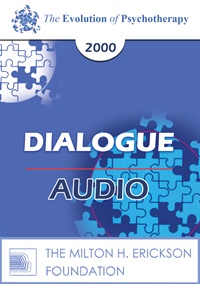
- Average Rating:
- Not yet rated
- Topic Areas:
- Psychotherapy | Dialogues | Therapeutic Relationship | Therapist Development
- Categories:
- Evolution of Psychotherapy | Evolution of Psychotherapy 2000
- Faculty:
- Albert Ellis, PhD | Eugene Gendlin, PhD
- Duration:
- 55 Minutes
- Format:
- Audio Only
- Original Program Date:
- May 27, 2000
- Short Description:
- EP00 Dialogue 02 - The Therapeutic Relationship - Albert Ellis, Ph.D., and Eugene Gendlin, Ph.D. Given a topic, to become aware of the differing approaches to psychotherapy, and to identify the strengths and weaknesses in each approach. Moderated by Ellyn Bader, Ph.D.
- Price:
- $15.00 - Base Price
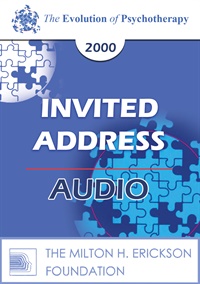
- Average Rating:
- Not yet rated
- Topic Areas:
- Invited Addresses | Social Issues | Psychotherapy | Therapist Development
- Categories:
- Evolution of Psychotherapy | Evolution of Psychotherapy 2000
- Faculty:
- Jay Haley, MA | Arnold Lazarus, Ph.D.
- Duration:
- 1 Hour 16 Minutes
- Format:
- Audio Only
- Original Program Date:
- May 29, 2000
- Short Description:
- Often meetings on therapy focus on differences among therapists; overlooked is what they have in common. Basic ideas are hidden in social and political actions.
- Price:
- $15.00 - Base Price
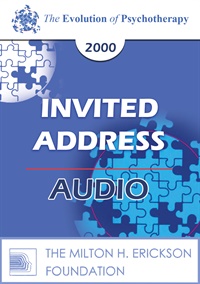
- Average Rating:
- Not yet rated
- Topic Areas:
- Invited Addresses | Therapist Development | Psychotherapy
- Categories:
- Evolution of Psychotherapy | Evolution of Psychotherapy 2000
- Faculty:
- Jeffrey Zeig, PhD | Erving Polster, PhD
- Duration:
- 1 Hour 27 Minutes
- Format:
- Audio Only
- Original Program Date:
- May 29, 2000
- Short Description:
- Therapy promotes "movement." To facilitate movement the therapist can assume therapeutic "postures." These postures are a font from which interventions follow.
- Price:
- $15.00 - Base Price
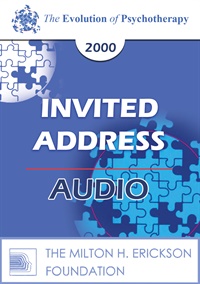
- Average Rating:
- Not yet rated
- Topic Areas:
- Psychotherapy | Invited Addresses | Therapist Development
- Categories:
- Evolution of Psychotherapy | Evolution of Psychotherapy 2000
- Faculty:
- Donald Meichenbaum, PhD | Jay Haley, MA
- Duration:
- 1 Hour 31 Minutes
- Format:
- Audio Only
- Original Program Date:
- May 25, 2000
- Short Description:
- Based on a review of the psychotherapy literature, seven core tasks that psychotherapists need to include and five additional core tasks of psychotherapy for patients with a history of victimization have been identified. A case conceptualization model and treatment guidelines on how to become a more effective psychotherapist will be offered.
- Price:
- $15.00 - Base Price
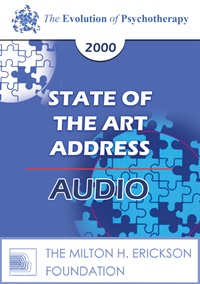
- Average Rating:
- Not yet rated
- Topic Areas:
- State of the Art Address | Belief Systems | Psychotherapy | Therapist Development
- Categories:
- Evolution of Psychotherapy | Evolution of Psychotherapy 2000
- Faculty:
- Albert Bandura
- Duration:
- 51 Minutes
- Format:
- Audio Only
- Original Program Date:
- May 27, 2000
- Short Description:
- State of the Art Address 03: Belief in one's personal efficacy is the foundation of human motivation, accomplishments and emotional well-being. This address will analyze the sources of people's beliefs in their efficacy, their cognitive, motivational and emotional effects, and how to build a resilient sense of efficacy for personal and social betterment.
- Price:
- $15.00 - Base Price
Please wait ...



